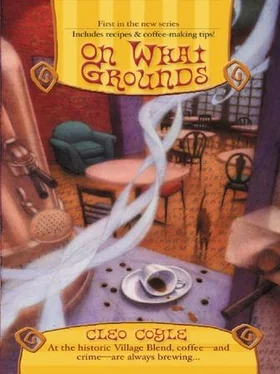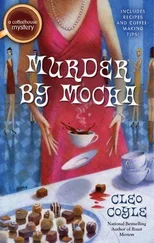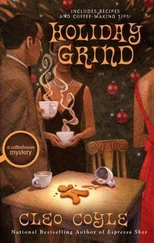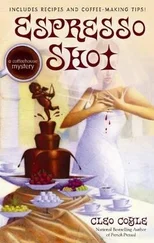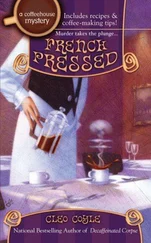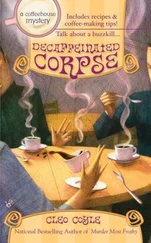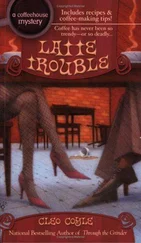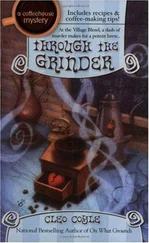“What’d we miss?” asked Matt.
“Oh, just four courses,” said Madame with a wave of her hand. “But coffee and dessert are on their way.”
“Sorry it took so long,” said Matt, waving his Palm Pilot. “I, uh, had some trouble finding my little tool.”
“Oh, I’m sure you did!” cried Madame with glee. “But I’ll just bet Clare was a big help in that department!” A bawdy wink set the entire table chuckling.
“Matt really did need it,” I said, not knowing what else to say. I mean, I couldn’t very well shout, Uh, people! Contrary to how this appears, Matt and I were not tossing in the sheets—we were tossing a suspect’s room.
“What was so important on that Palm Pilot, then?” asked Madame.
“I, uh, had to confirm the size of an order with one of my growers—” said Matt.
“Oh, really?” asked Eduardo Lebreux, suddenly interested. “Who?”
“Peruvian.”
“What plantation?”
Matt smiled briefly. “Sorry, friend, trade secret.”
“Matt’s been the Blend’s coffee buyer for two decades,” Madame proudly announced to the table of ten. “Brokers for futures, as well. Learned the business from his father—who learned it from his. Of course, they always needed the steady hand of a dedicated woman to keep the place running like clockwork,” she added with a pointed look at her son.
“Interesting. And how does one ‘broker’ for coffee futures?” asked Deputy Commissioner Marjorie Greenberg.
“Buy low and sell high,” said Matt with a charming smile. “Actually coffee’s a world commodity second only to oil.”
“It’s also the world’s most popular beverage,” I added by rote. “Four hundred billion cups a year.”
“Yes,” said Matt, “and we’re attempting to sell every last one through the Village Blend.”
The table of ten laughed.
“Well, I for one think the Village Blend is more than just a place to drink coffee,” Dr. McTavish announced to the rest of the table. “It’s practically an institution.”
“We love the place,” agreed McTavish’s African-American colleague, Dr. Frankel. His corporate lawyer wife, Harriet, nodded enthusiastically in agreement.
“So do we,” said Marjorie Greenberg. Her psychologist husband seconded, “It’s a legend, all right.”
“My out-of-town friends love it, too,” said Harriet Frankel. “And my clients. All of them have heard of it over the years. All those wonderful old knickknacks and mismatched furniture on the second floor. It’s so…so bohemian. It’s wonderful!”
“I certainly hope it doesn’t go the way of the other Village institutions,” said Deputy Commissioner Marjorie. “Like the Pageant Book Shop and St. Mark’s Theater.”
“That theater’s now a Gap store, isn’t it?” asked Lawyer Harriet.
“The Village Blend will stand long after I’m gone,” said Madame firmly. “I’m seeing to that.” She threw me and Matt a pointed look.
“And reputation is the thing in this country, is it not?” said Eduardo.
“What thing?” I asked.
“I mean to your American buying public. You buy and sell things here under names—brands, no? And the most valuable of these brand names are the ones that have been around for many decades.”
“Oh, right,” said the psychologist. “You mean like Campbell’s Soup and Ivory Soap?”
“Yes, yes,” said Eduardo. “Now look at that Stewart woman’s problems—”
“Oh, yes, Martha Stewart,” said Harriet. “Bad bit of luck, getting caught in an insider trader scandal like that.”
“She was seen as…how you say…tainted,” said Eduardo, “so her company’s stock falls.”
“What’s your point?” I asked.
“My point is that she was a new brand, not an old and trusted one in this country. Not yet. Not like Ivory Soap or Campbell’s Soup, or the Village Blend. You see?”
“No,” I said.
“Oh, I do,” said Madame with a little laugh. “Eduardo has been after me to sell him the Blend. He had his heart set on making it a franchise.”
“What?” I asked. “Like McDonald’s?”
“Like Starbucks,” he said sharply. Then seemed to catch himself and soften the harsh tone with a forced chuckle.
“There will only ever be one Village Blend,” said Madame. “As long as I own the place—and my intentions are respected by those who own it in the future. And I’ve made sure that it will be Matt and Clare here.”
“Oh, fabulous!” “How wonderful!” “Here’s to the ongoing legacy!” cried voices around the table.
Matt and I glanced at each other. Everyone seemed genuinely happy at this news. Except Eduardo, whose smile was as plastic as they come.
Well, I thought realistically, he’s lost the Blend for good. Why should he be happy for us?
Dessert and coffee were served about then. Madame had ordered coffee for both Matt and me since we’d been away from the table when the orders were taken.
I myself, having missed dinner, was overjoyed to see the steaming cup of coffee sitting next to a slice of flourless chocolate cake garnished with mint leaves and raspberries. I practically inhaled it. Matt, on the other hand, simply frowned and grunted.
“What’s the problem?” I asked.
“I’m desperate for a hit of caffeine,” he said, “but I can’t abide the coffee at these things. Dishwater and cream.”
“Not tonight,” I said. “The Village Blend provided the beans a few days ago, isn’t that right, Madame?”
“It is,” she said. “Clare roasted the beans over the weekend and shipped the bags up Monday.”
“That’s a lot of extra work, Clare,” said Matt, sniffing the cup and taking a cautionary sip. “Not bad. I hope you charged the Waldorf a pretty penny.”
“It’s a charity benefit, Matt. I discounted the rate.”
Matt let out a frustrated sigh at this news.
Eduardo Lebreux, on the other hand, let out a hearty laugh.
“Something funny?” I asked.
“Yes,” said Eduardo. “The small business owner has to play whatever angles he can. The big pockets will take the tax write-offs anyway. You should have listened to your husband.”
“Matt is not—” I stopped short of adding my husband.
(I did plan to make clear to Madame that Matt and I would never again be man and wife—no matter how many times she introduced us the other way—but I wouldn’t do that to her in public. I had no interest in embarrassing her here so…)
Instead, I said, “Matt is not— correct, ” and added, “There’s no need to take a profit at the expense of a fund-raiser for a good cause.”
“Even so,” said Eduardo, “this is America. Whether the coffee tastes good or not is beside the point.”
“Excuse me,” said Matt. “But that’s my entire point.”
“Maybe for you,” said Eduardo, “but you are not common. Most of the people here would drink down whatever came to them at the table, even if it tasted like, as you say, dishwater. They would drink it down and think it was good because it was being served to them in a Waldorf-Astoria cup, you see?”
“No,” I said, getting slowly annoyed.
“Most people in America decide what they like by the brand name,” said Eduardo. “It is the package they buy, not the contents. You see?”
“No,” I said. “We Americans might buy something once or twice because of an advertisement or marketing campaign or even brand loyalty, but if the quality goes bad on us, we’re gone. You’ll lose us forever. Haven’t you ever heard of the expression ‘Where’s the beef?’”
“No.”
“Trust me,” I said. “It’s red-white-and-blue. And there’s nothing as American as the pragmatic expectation of getting what you pay for. Perhaps it’s the Europeans with whom you’re confusing us—the Old World idea of believing aristocrats or royalty at face value.”
Читать дальше
